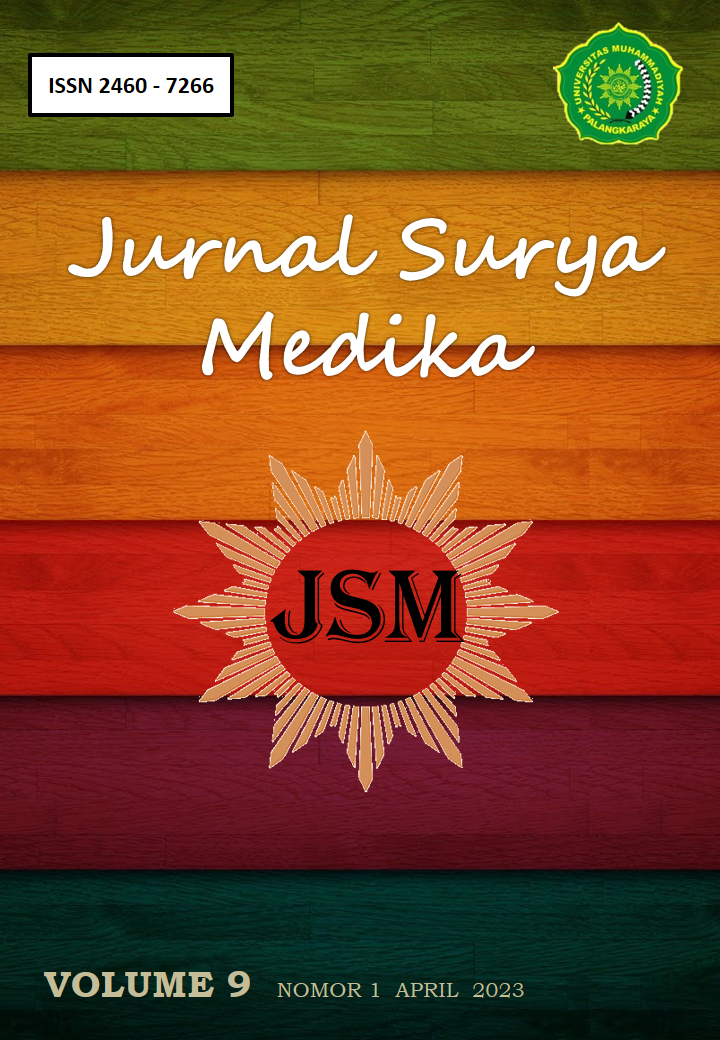Uji Antibakteri Ekstrak Etanol Akar Tawas Ut (Ampelocissus Rubiginosa Lauterb) pada Eschericia Coli dan Staphylococcus aureus Secara In Vitro In Vitro Antibacterial Test of Ethanol Extract of Ut Tawas Root (Ampelocissus Rubiginosa Lauterb) on Eschericia Coli and Staphylococcus aureus
Main Article Content
Abstract
The used of antibiotics to control bacterial growth has a negative impact such as antibiotics resistance. Began to look for alternative materials from nature, including saponins, flavonoids, catechins and tannins which are known to be contained in the roots of Tawas Ut (Ampelocissus rubiginosa Lauterb). This plant has been used empirically by the people of Central Kalimantan, namely as a medicine for wounds and diarrhea. The efficacy of alum root has not been scientifically proven. The antibacterial properties of this plant have the potential as a source of antibacterial compounds for the growth of E. coli and S. aureus in vitro. The research method used was the Kirby Bauer Antibacterial Testing method. The ethanol extract of alum ut root has antibacterial activity against E. coli and S. aureus, with an extract concentration of 250 mg∙ml-1 giving the highest average clear zone value of 12.33 mm in E. coli and S. aureus, and was able to give a clear zone with the lowest concentration of 12.5 mg∙ml-1 of 11.33 mm in E. coli and 11.67 mm in S. aureus. The minimum inhibitory concentration (MIC) of ut alum root ethanol extract on E. coli and S. aureus was 15.6 mg∙ml-1.
Downloads
Article Details

This work is licensed under a Creative Commons Attribution-ShareAlike 4.0 International License.
All rights reserved. This publication may be reproduced, stored in a retrieval system, or transmitted in any form or by any means, electronic, mechanical, photocopying, recording.
References
Anonim. 2012. Comparative Characteristics of Gram-Positive and Gram-Negative Bacteria. http://www.life.umd.edu/classroom/bsci424/BSCI223WebSiteFiles/GramPo svsGramNeg.htm Diakses tanggal 15 Oktober 2011
Arabski, M. A. Lankoff, A. Wegierek-Ciuk & W. Kaca. 2012. Effects of Saponins against Clinical E. coli Strains and Eukaryotic Cell Line. Journal of Biomedicine and Biotechnology. Volume 2012, Article ID 286216, 6 pages.
Clinical and Laboratory Standards Institute. 2011. Performance Standards for Antimicrobial Susceptibility Testing; Twenty-First Informational Supplement. Clinical and Laboratory Standards Institute, 940 West Valley Road, Suite 1400, Wayne, Pennsylvania 19087-1898, USA.
Cushnie, T.P.T. & A.J. Lamb. Antimicrobial Activity of Flavonoids. 2005. International Journal of Antimicrobial Agents. 26 (2005), 343–356.
Dewi, F. K. 2010. Aktivitas Antibakteri Ekstrak Etanol Buah Mengkudu (Morinda citrifolia, Linnaeus) terhadap Bakteri Pembusuk Daging Segar. Skripsi. Universitas Sebelas Maret, Surakarta.
Latifah, A. 2011. Kajian Farmakognostik Akar Tawas Ut (Ampelocissus rubiginosa L.) asal Kalimantan Tengah. Skripsi. FMIPA Universitas Lambung Mangkurat, Banjarbaru (tidak dipublikasikan).
Lullmann, H., A. Ziegler, K. Mohr, D. Bieger. 2000. Color Atlas of Pharmacology. Second Edition. Thieme Stuttgard. USA.
Madappa, T. 2011. Escherichia coli Infections. http://emedicine.medscape.com/article/217485-overview Diakses tanggal 15 Oktober 2011
Tiwari, P., B. Kumar, M. Kaur, G. Kaur & H. Kaur. 2011. Phytochemical Screening and Extraction: A Review. Intern Pharm Sci. 1(1): 98-106.
Venkatakrishna, I.R., G.B. Kishore, S.K. Manohar, P. Vidya & S. Manjula. 2011. Detection of Methicillin Resistance in Staphylococcus aureus: Comparison of Disc diffusion and MIC with mecA gene detection by PCR. IJPBS. 1(4): 518-521.
Wilson, R.P.A. 2004. Management of Glycopeptide-Resistant Staphylococcus aureus Infections. Dalam Gillespie, H.S. Management of Multiple DrugResistant Infections. Humana Press, USA.
